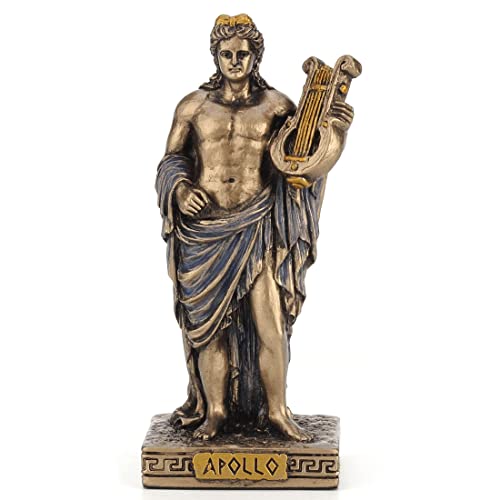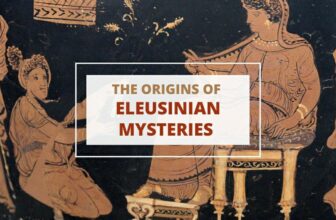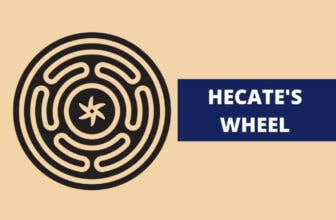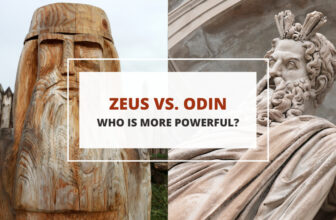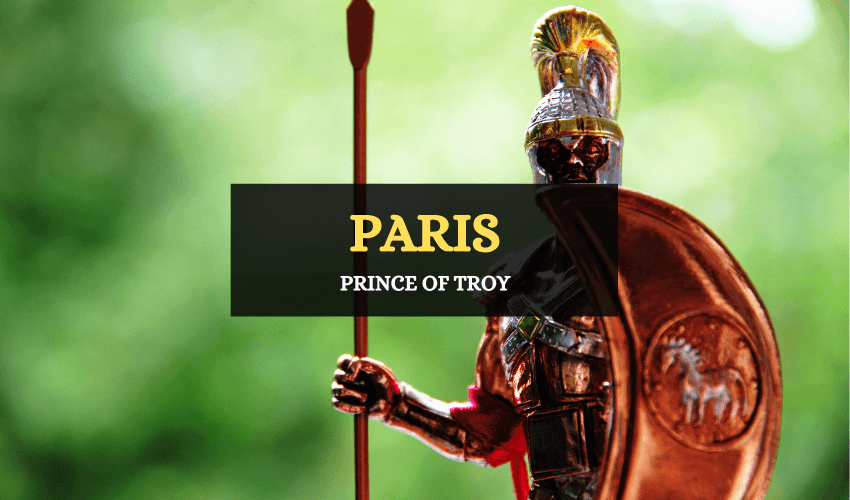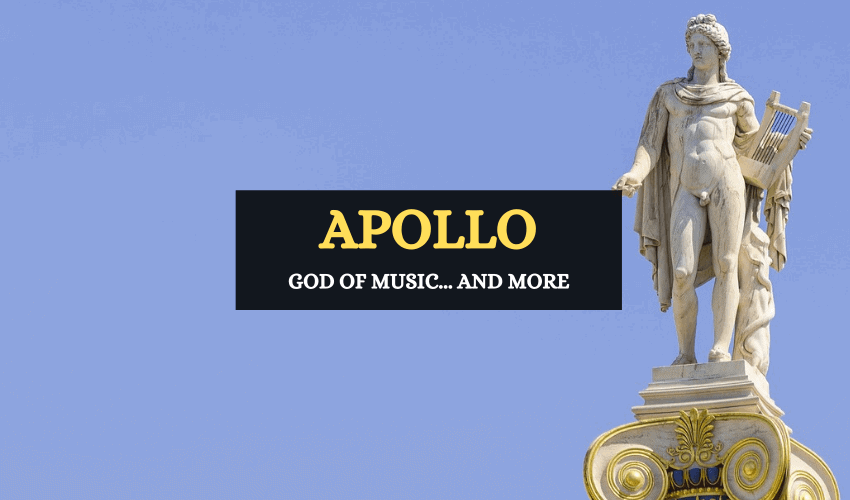
Table of Contents
Apollo is one of the twelve Olympian gods, and among the most important of the Greek pantheon of gods. Apollo is the son of Zeus and the Titan goddess Leto, and the twin brother of Artemis, the goddess of the hunt. Apollo played many roles in Greek mythology, being the god of a range of areas, including healing, archery, music, the arts, sunlight, knowledge, oracles and herds and flocks. As such, Apollo was an important god with influence in many areas.
Life of Apollo
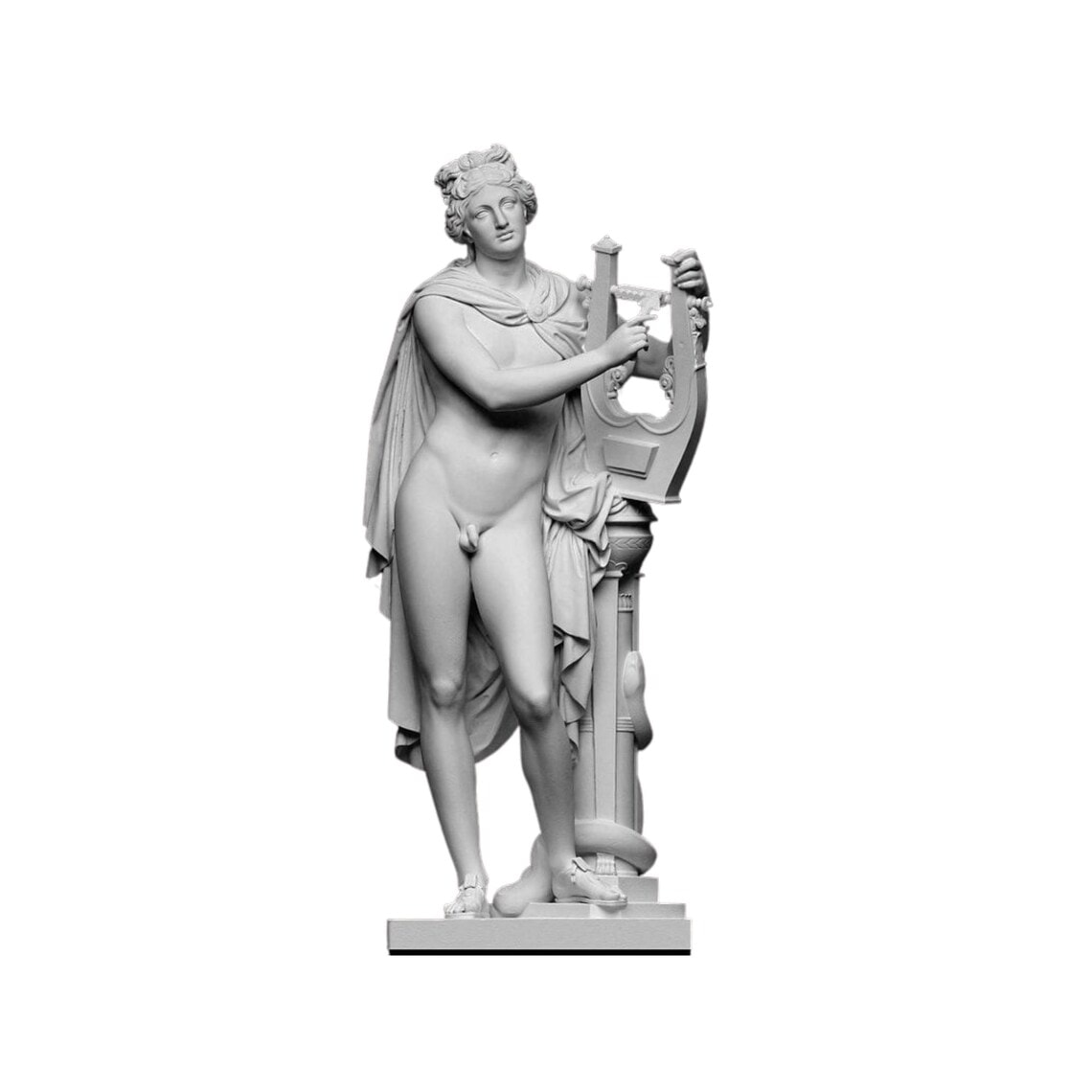
Birth of Apollo
When Leto was about to give birth to Apollo and Artemis, Hera, who was vengeful that her husband Zeus had bedded Leto, decided to make life difficult for her. She sent forth Python, a serpent-dragon, to pursue and torment Leto.
Python was a giant serpent-dragon borne out of Gaea and the guardian of Delphi’s Oracle. Hera sent the beast to hunt Leto and her children, who then were still inside their mother’s womb. Leto was able to successfully evade Python.
Hera also forbade Leto to give birth on terra firma, or land. Due to this, Leto had to find wander around, looking for a place to deliver her children that was not connected to land. As per Hera’s instructions, no one would give Leto sanctuary. Finally, she arrived at the floating island of Delos, which neither the mainland nor an island. Leto delivered her children here under a palm tree, with all the goddesses in attendance except for Hera.
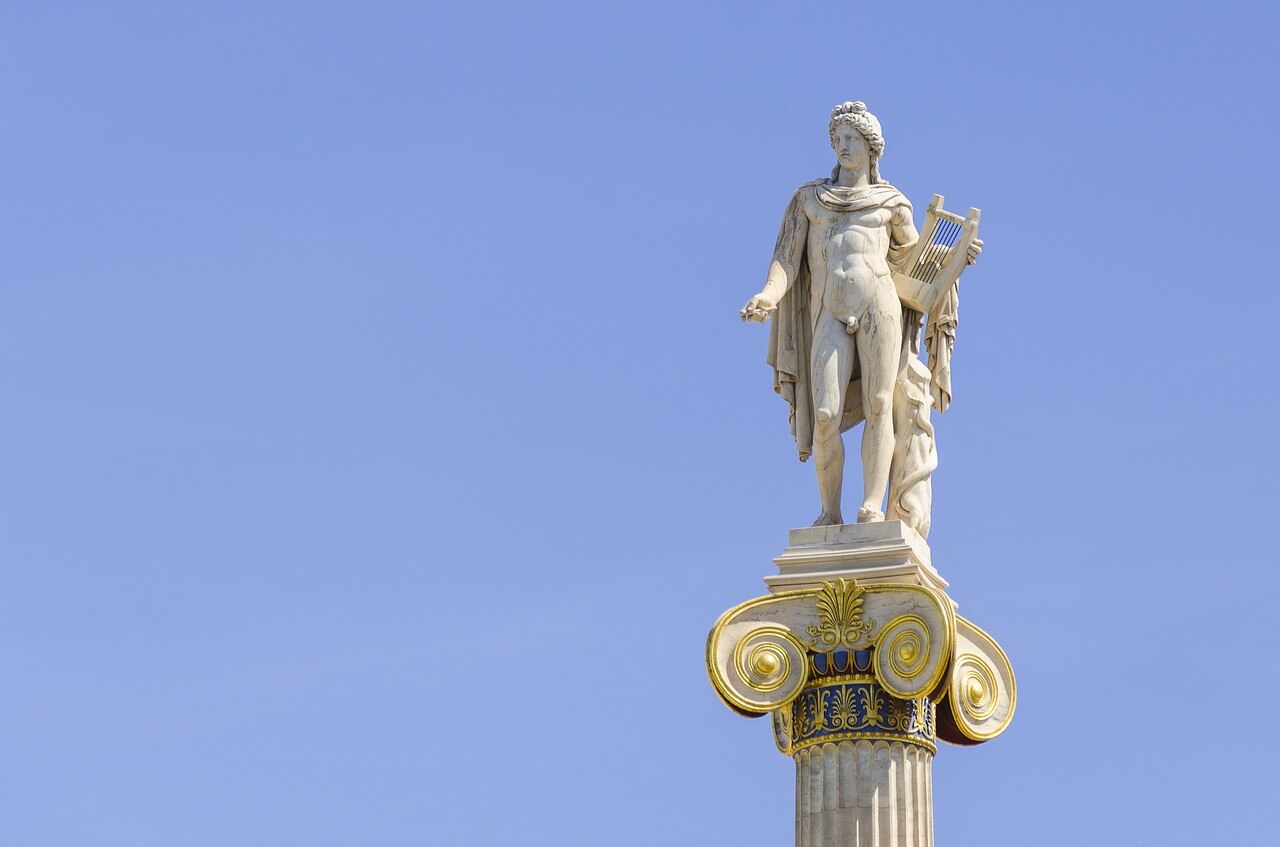
In some versions, Hera kidnaps the goddess of childbirth, Eileithyia, so that Leto couldn’t go into labor. However, the other deities trick Hera by distracting her with an amber necklace.
Apollo came out of his mother’s womb holding a golden sword. When he and his sister were born, every single item on the island of Delos turned to gold. Themis then fed Apollo ambrosia (nectar) which was common food of the gods. Immediately, Apollo grew strong and declared that he would be the master of the lyre and of archery. Thus, he became the patron god of poets, singers, and musicians.
Apollo Slays Python
Apollo grew quickly on his diet of ambrosia, and within four days he was thirsting to kill Python, who had tormented his mother. To avenge the hardships the creature brought upon his mother, Apollo sought Python and killed it in a cave in Delphi, with a set of bow and arrows given to him by Hephaestus. In most depictions, Apollo is described as still being a child when he kills Python.
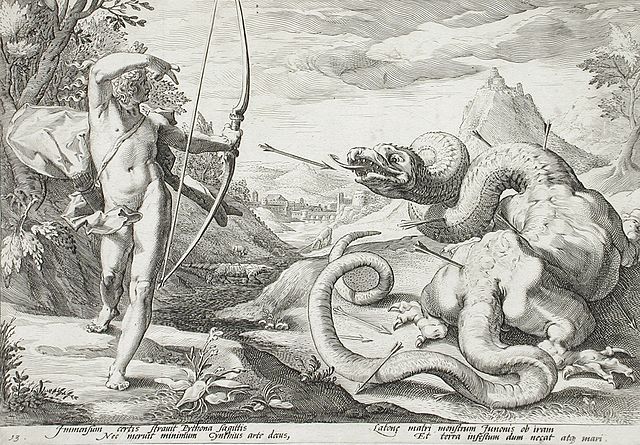
Apollo Becomes a Slave
Enraged that Apollo had killed Python, one of her children, Gaia demanded that Apollo be banished to Tartarus for his crimes. However, Zeus disagreed and instead temporarily banned him from entering Mount Olympus. Zeus told his son to cleanse himself from his sin of murder if he wanted to return to the abode of the gods. Apollo understood and worked as a slave for King Admetus of Pherae for eight or nine years.
Admetus became Apollo’s favorite and the two are said to have been in a romantic relationship. Apollo helped Admetus to marry Alcestis and gave them his blessing at their wedding. Apollo valued Admetus so much that he even intervened and convinced the Fates to allow Admetus to live longer than they had designated.
After his service, Apollo was then ordered to travel to the Vale of Tempe to bath in the Peneus River. Zeus himself performed the cleansing rites and was finally given rights to the Delphic shrine, which he claimed. Apollo also demanded to be the sole god of divination, which Zeus obliged.
Apollo and Helios
Apollo is sometimes identified with Helios, god of the sun. Due to this identification, Apollo is depicted as riding a chariot pulled by four horses, moving the sun across the sky each day. However, Apollo wasn’t always associated with Helios as this only occurs in some versions.
Apollo in the Trojan War
Apollo fought on the side of Troy against the Greek. He offered assistance to Trojan heroes Glaukos, Aeneas, and Hector. He brought plague in the form of deadly arrows raining down on the Achaeans and is also cited as guiding Paris’ arrow to the heel of Achilles, in effect killing the invincible Greek hero.
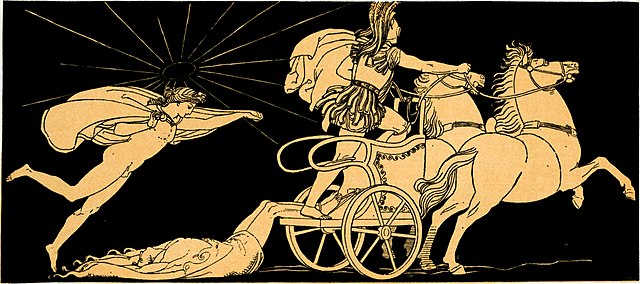
Apollo Helps Heracles
Only Apollo was able to help Heracles, at the time known as Alcides, when the latter was struck with madness that made him kill his family. Wanting to purify himself, Alcides sought the help of the oracle of Apollo. Apollo then instructed him to serve a mortal king for 12 years and to complete the tasks given to him by such king. Apollo also gave Alcides a new name: Heracles.
Apollo and Prometheus
When Prometheus had stolen the fire and given it to the humans in defiance of Zeus’ orders, Zeus was angry and punished the Titan. He had him chained to a rock and tormented by an eagle who would eat out his liver every day, only to have it regrow to be eaten the next day. Apollo, together with his mother Leto and sister Artemis, pleaded with Zeus to release Prometheus from this eternal torture. Zeus was moved when he heard Apollo’s words and saw the tears in Leto’s and Artemis’ eyes. He then allowed Heracles to release Prometheus.
Apollo’s Music
The Greek philosopher Plato believes that our ability to appreciate rhythm, harmony, and music is a blessing from Apollo and the Muses. Several stories tell of Apollo’s mastery of music.
- Pan vs. Apollo: On one occasion, Pan, inventor of the panpipes, challenged Apollo to a contest to prove that he was the better musician. Pan lost the challenge as almost everyone present chose Apollo as the winner, except for Midas. Midas was given the ears of an ass because he was deemed unable to appreciate music with human ears.
- Apollo and the Lyre: Either Apollo or Hermes created the lyre, which became an important symbol of Apollo. When Apollo heard Hermes play the lyre, he immediately loved the instrument and offered to give Hermes the cattle he was after in exchange for the instrument. From then on, the lyre became Apollo’s instrument.
- Apollo and Cinyras: To punish Cinyras for breaking a promise made to Agamemnon, Apollo challenged Cinyras to play the lyre in a contest. Naturally, Apollo won and Cinyras either killed himself at being defeated or was killed by Apollo.
- Apollo and Marysas: Marysas, a satyr under a curse of Athena, believed he was a greater musician than Apollo and taunted Apollo and challenged him to a contest. In some versions, Apollo wins the contest and flays Marysas, while in other versions, Marysas accepts defeat and allows Apollo to flay him and make a wine sack out of him. In any case, the result is the same. Marysas meets a violent and brutal end at the hands of Apollo, is hung from a tree and flayed.
Apollo’s Romantic Interests
Apollo had many lovers and numerous children. He’s depicted as a handsome god and one that mortals and gods both found attractive.
- Apollo and Daphne
One of the most popular stories involving Apollo relates to his feelings for Daphne, a nymph. Eros, the mischievous god of love, had shot Apollo with a golden arrow that made him fall in love, and Daphne with a lead arrow of hatred. When Apollo saw Daphne, he immediately fell for her and pursued her. However, Daphne rejected his advances and escaped from him. Daphne turned herself into a laurel tree to escape Apollo’s advances. This myth supposedly explains how the laurel tree originated and why Apollo is often depicted with laurel leaves.
- Apollo and the Muses

The Muses were a group of nine beautiful goddesses who inspire art, music and literature, areas with which Apollo is also concerned. Apollo loved all nine muses and slept with them all, but he couldn’t decide which of them he wanted to marry and so he remained unwed.
- Apollo and Hecuba
Hecuba was the wife of King Priam of Troy, father of Hector. Hecuba bore Apollo a son called Troilus. When Troilus was born, an oracle prophesied that as long as Troilus was alive and allowed to reach maturity, Troy would not fall. On hearing of this, Achilles ambushed and attacked Troilus, killing him and dismembering him. For this monstrosity, Apollo ensured that Achilles would be killed, by guiding Paris’ arrow towards his heel, Achilles’ most vulnerable point.
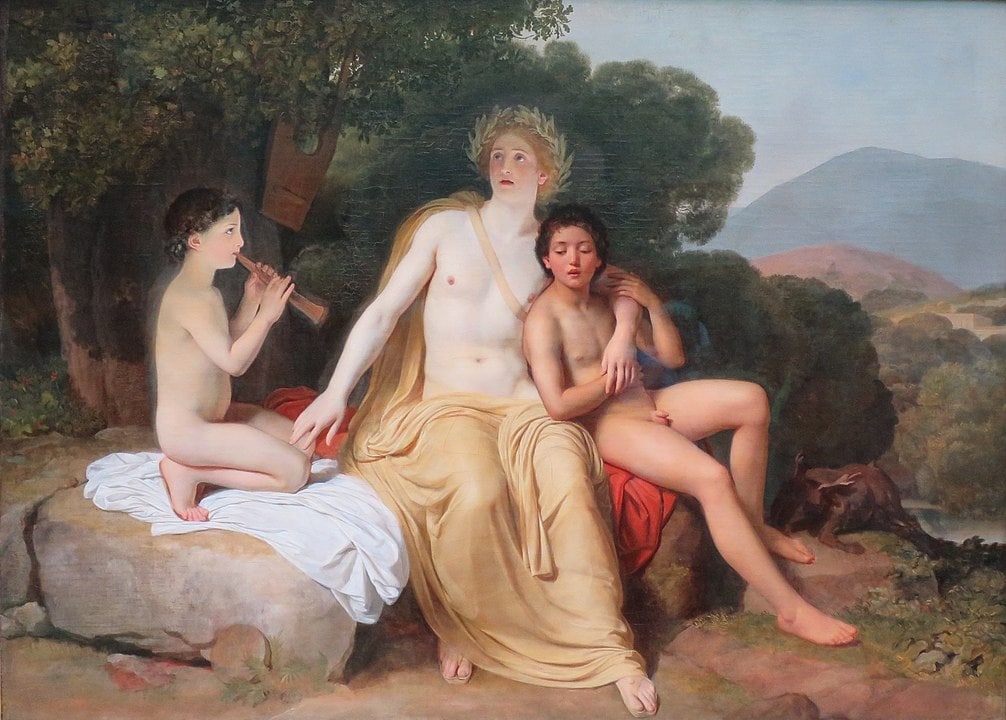
- Apollo and Hyacinth
Apollo also had many male lovers, one of whom was Hyacinth, or Hyacinthus. A handsome Spartan prince, Hyacinth were lovers and deeply cared for each other. The two were practising throwing the discus when Hyacinth was struck by Apollo’s discus, taken off course by the jealous Zephyrus. Hyacinth was instantly killed.
Apollo was distraught and created a flower out of the blood that flowed from Hyacinth. This flower was named Hyacinth.
- Apollo and Cyparissus
Cyparissus was another of Apollo’s male lovers. Once, Apollo gave Cyparissus a deer as a gift, but Cyparissus killed the deer by accident. He was so saddened by this that he asked Apollo to allow him to cry forever. Apollo turned him into a Cypress tree, which has a sad, drooping look with the sap leaking out in droplets like tears on the bark.
Symbols of Apollo
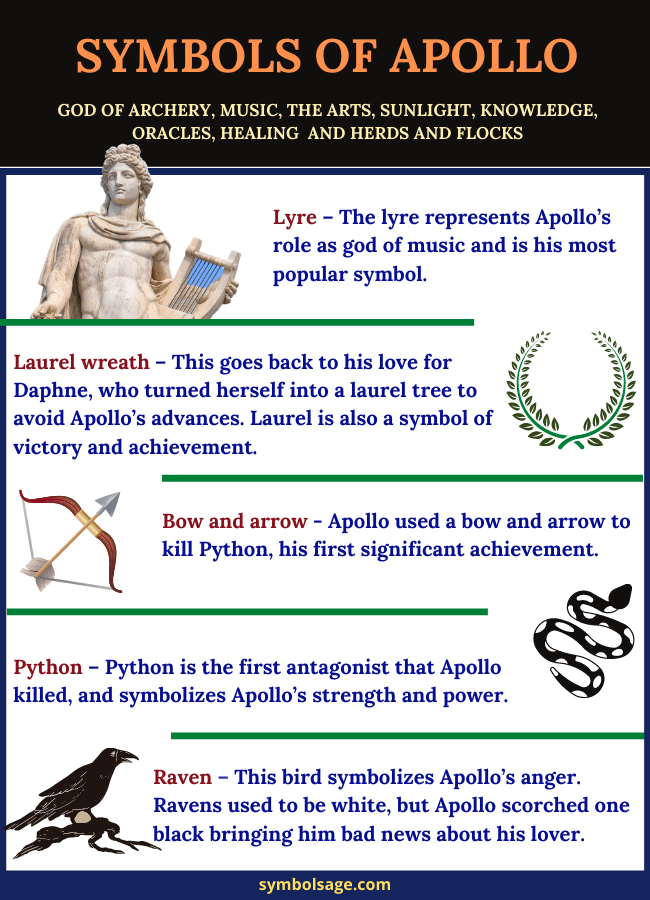
Apollo is often depicted with the following symbols:
- Lyre – As god of music, the lyre represents Apollo’s mastery as a musician. It’s said that Apollo’s lyre could turn everyday objects into musical instruments.
- Raven – This bird symbolizes Apollo’s anger. Ravens used to be white, but once, a raven brought back the message that Coronis, Apollo’s lover, was sleeping with another man. In anger, Apollo cursed the bird for not attacking the man, turning it black.
- Laurel wreath – This goes back to his love for Daphne, who turned herself into a laurel tree to avoid Apollo’s advances. Laurel is also a symbol of victory and achievement.
- Bow and arrow – Apollo used a bow and arrow to kill Python, his first significant achievement. This symbolizes his bravery, courage and skills.
- Python – Python is the first antagonist that Apollo killed, and symbolizes Apollo’s strength and power.
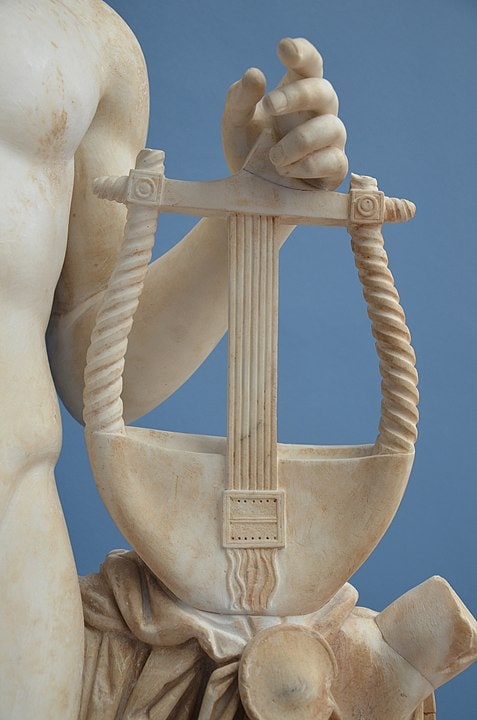
Below is a list of the editor’s top picks featuring the statue of Apollo.
Significance of Apollo in Modern Culture
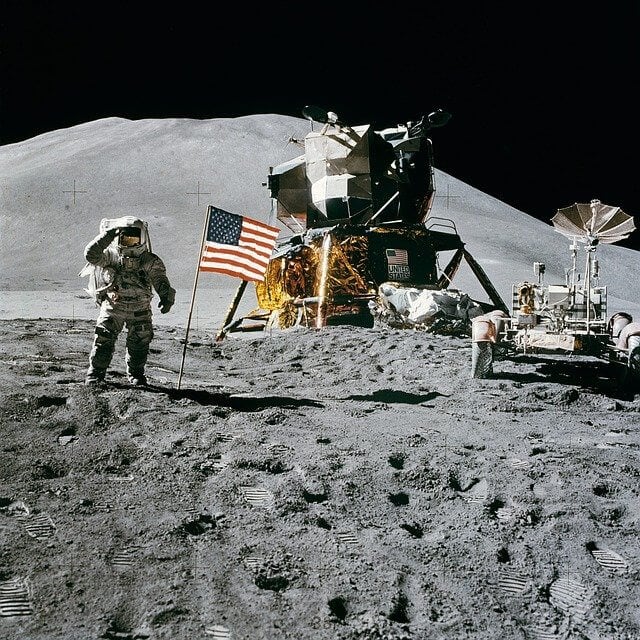
The most popular manifestation of Apollo is the naming of the moon-bound NASA spacecraft after him.
A NASA executive thought the name was fitting, since the image of Apollo riding his chariot towards the sun was commensurate to the grand scale of the proposed moon landing.
As the patron of civilized arts, many theaters and performance halls across the world are also named after this god.
Apollo Facts
Apollo’s parents are Zeus and Leto.
Apollo lives on Mount Olympus with the other Olympian gods.
Apollo had several siblings and a twin, Artemis.
Apollo had numerous children from mortals and goddesses. Of all his children, the most famous is Asclepius, god of medicine and healing.
Apollo never married but he had many consorts, including Daphne, Coronis and several others. He also had numerous male lovers.
Apollo is often depicted together with the lyre, laurel wreath, raven, bow and arrow and python.
Apollo is the god of the sun, arts, music, healing, archery and many other things.
Apollo is the only Greek deity to maintain the same name in Roman mythology. He’s known as Apollo.
Wrapping Up
Apollo remains one of the most loved and complex of the Greek gods. He had a significant impact on Greek society and his rule encompassed a great many areas.






